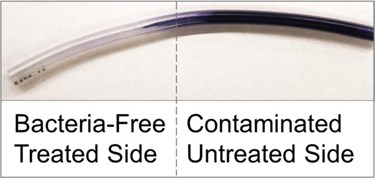Reducing Biofilm Buildup On Implanted Devices With Liquid-Infused Polymers

Bacterial colonies called biofilms that collect on a medical device’s surface are notoriously difficult to eradicate and put patients at risk of life-threatening infection. In a recent development to address the problem, Harvard University researchers have developed a long-lasting, slippery polymer technology that prevents biofilms from adhering to device surfaces.
The technology, known as liquid-infused polymers, consists of a silicone polymer that is saturated with silicone oil, creating a slippery surface that bacteria have difficulty colonizing. So much oil is infused in the tubing that the coating is replenished as the surface layer is washed away. The coating is functional over a long period of time, can be sterilized like other medical materials, and could be useful in devices such as catheters, researchers from Harvard's School of Engineering and Applied Sciences (SEAS) and Wyss Institute for Biologically Inspired Engineering reported in a news release.
“The solid silicone tubing is saturated with silicone oil, soaking it up into all the tiny spaces in its molecular structure so that the two materials really become completely integrated into one,” said Caitlin Howell, a co-author of the study.
The scientists, led by Joanna Aizenberg, a professor at the Wyss Institute, claim the tubing can store a large reservoir of lubricant that can rise to the surface as needed. All of the materials used in the technology are currently used in existing medical devices and are non-toxic to the human body.
Researchers tested the efficacy of the technology by exposing both treated and untreated tubing to Pseudomonas aeruginosa, Escherichia coli, and Staphylococcus epidermidis, three strains of bacteria most common in urinary, tissue, and blood infections. The treated surfaces showed significant reduction in biofilm adhesion.
In the study, published in ACS Biomaterials Science and Engineering, Harvard researchers presented the technology as a proof-of-concept medical material. “This work represents an important step toward a simple and effective means of preventing bacterial adhesion on a wide range of materials used for medical devices.”
Donald Ingber, director of the Wyss Institute, commented in the SEAS press release that the development of biofilm resistant materials was critically important because of the increasing prevalence of antibiotic-resistant bacterial strains.
In a 2013 study of antibiotic resistant threats, the Centers for Disease Control and Prevention (CDC) reported that at least 2 million Americans are infected with resistant bacterial strains per year, resulting in at least 23,000 deaths.
In the past two years, Med Device Online reported two other developments of slippery surface technology engineered by Aizenberg’s team. These materials are based on the same Liquid-Infused Porous Surfaces (SLIPS) premise as the current research. The first study could lead to self-cleaning, scratch-resistant glass. The second could reduce the risk of blood clot formation.
Image credit: Joanna Aizenberg
